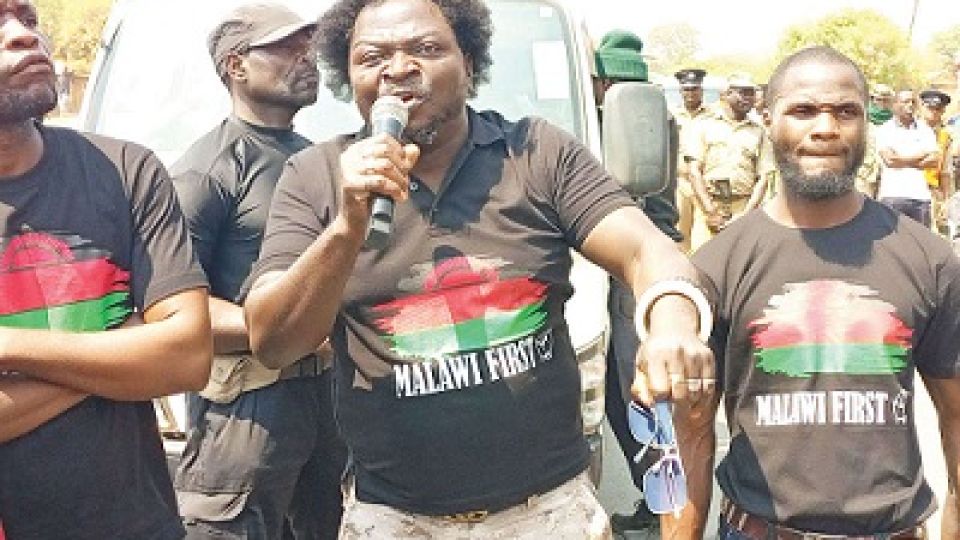from MAVHUTO BANDA in Lilongwe, Malawi
Malawi Bureau
LILONGWE, (CAJ News) – MALAWI has degenerated into running battles between protesters and security forces following demonstrations over the increased cost of living and devaluation of the local currency.
The protests, led by human rights activist Bon Kalindo, spilled to the southern city of Zomba on Thursday, a day after similar protests in Blantyre, Malawi’s centre for finance and commerce, as well as its second-largest city.
Security forces have used tear gas to disperse protestors who were accused of being unruly.
Kalindo has been arrested following the impasse.
Earlier this week, clashes erupted between street vendors and Blantyre City Council (BCC) in the Limbe neighbourhood during operations by security forces to evict the vendors.
Things turned ugly when BCC officials were snatching merchandise from vendors, who retaliated by stoning a BCC vehicle carrying officials.
Four people were arrested.
Minister of Information and Digitalisation, Moses Kunkuyu, intervened.
“I know that with devaluation, everyone is concerned including vendors but the government wishes to ensure that people do business freely while abiding by laws,” he said.
Limbe has been the scene of long-running clashes between law enforcers and vendors, who see this as their only source of livelihood in one of the world’s poorest countries.
As authorities respond to the protests, security experts projected localized travel disruptions in affected areas of the Southern African country.
“Further clashes between police forces and protesters are possible in the coming hours should participants ignore orders to disperse,” an analyst said.
The protest action and security personnel response, which could include road closures, will likely result in ground travel and business operation disruptions. This could be worsened by demonstrators agitated by the arrest of the protest leader.
Kalindo, the activist-cum-politician, is a fierce critic of the administration of President Lazarus Chakwera.
The source of the conflict is the Reserve Bank of Malawi devaluing the local kwacha by 44 percent against the United States dollar, citing “supply-demand imbalances” in the market.
The central bank in mid 2022 also devalued the local currency by 25 percent to the dollar.
At the time of publication, 1 kwacha was equivalent to US$0,00059.
Since coming to power in 2020, Chakwera, a theologian, has come under criticism for his government’s alleged failure to address economic problems afflicting Malawi.
He has faced pressure from the main opposition Democratic Progressive Party (DPP) to resign over medicines and fuel shortages, foreign currency scarcity and rising grain prices.
Chakwera last week suspended all foreign trips by himself and government officials as an austerity measure.
On Thursday, he presided over the Anti-Corruption Symposium in the capital, Lilongwe, under the theme, “Rethinking Anti-Corruption Approaches for Malawi 2063.”
“A self-reliant and industrialised nation is possible only when corruption does not form part of our governance infrastructure,” the president said.
The International Monetary Fund (IMF) reports that Malawi’s real gross domestic product (GDP) is projected to increase by 1,6 percent in 2023, with shortages of foreign exchange still weighing on economic activity.
Inflation is expected to average 30,3 percent in 2023.
Previous governments in the country of 21 million people have faced demonstrations from citizens.
Protests erupted against the government of then president, Peter Mutharika, in 2019 amid demonstrations over government pensions and demands for democratic reforms. The protests lasted 17 months, during which an unspecified number of civilians were killed.
In 1992/93 the government of the dictator, Hastings Kamuzu Banda (now late), faced widespread demonstrations and violent protests demanding that the administration legalise political parties, end single-party rule, reinstate multiparty politics and release political prisoners.
At least 38 people were killed as police reacted with force.
The crisis preceded his downfall in 1994.
– CAJ News

